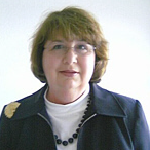
This story was written by Felicia Lederberger-Bialecki-Graber and shared as part of the Memory Project.
It is evening, fall of 1947. We are sitting in the kitchen, which also serves as dining room . The place is poorly lit by one single bulb hanging from the ceiling. There are four of us in this room, sitting around a square dark wooden table. My stepfather and my mother sit facing me. My mother is holding my brother on her lap. He is one year old and wears a blue knit bunting. I am seven years old and am anxious. I am starting to go to a new school tomorrow morning—not only a new school but a school in a different country and teaching in a different language, French. We have recently arrived from Poland to Brussels, Belgium, as political refugees from the new Polish Communist government. We do not have our beautiful apartment anymore but a dark, two-room flat located partly underground; our windows are on street level.
I remember hearing my mother telling my stepfather several times that day, “You have to tell her. I do not want her to go to school without her knowing.” I did not pay much attention to that. I do not remember even being curious about what I am supposed to know.
Then, I am told to sit down at the table because my stepfather needs to tell me something. I am not sure how he starts or his exact words, but this information I am about to hear will change my life forever. I will never again push myself to the altar in church to be as close as I can to the priest. I will never again smell the sweet incense. I am told that I am Jewish, not Catholic. “We are all Jews,” says my stepfather. “We had to pretend to be Catholic to save our lives in Poland during the war. Your mother is Jewish, your grandmothers and grandfathers were Jews forever. And, one more thing,” he adds. “I am not your stepfather; I did not marry your mother after the war. You never had a father who was a Polish soldier killed while fighting the Germans. I am your real father; you are my daughter, just as your brother is my son.

